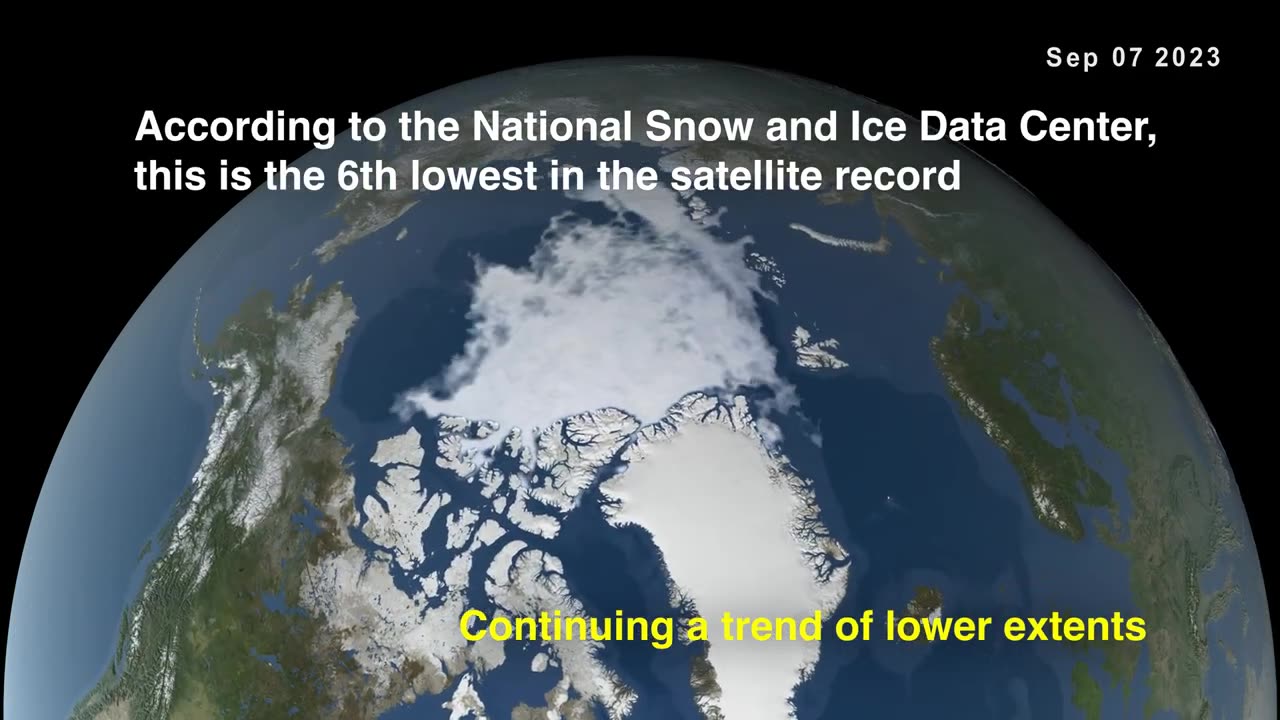Premium Only Content

Arctic Sea Ice Hits Annual Minimum, Antarctic Sets New Record
**Arctic and Antarctic Sea Ice at Record Lows in 2023**
Arctic sea ice reached its annual minimum extent on September 19, 2023, at 4.23 million square kilometers (1.63 million square miles), making it the sixth-lowest year in the satellite record. Antarctic sea ice, meanwhile, reached its lowest maximum extent on record on September 10 at 16.96 million square kilometers (6.55 million square miles).
These record lows are a sign of the ongoing and accelerating loss of sea ice due to climate change. Sea ice plays an important role in the Earth's climate system by reflecting sunlight back into space, regulating ocean temperatures, and providing habitat for wildlife.
The loss of sea ice is having a number of negative impacts on the Arctic and Antarctic ecosystems. For example, it is making it more difficult for polar bears to find food and for seals to raise their pups. It is also leading to more coastal erosion and flooding, and it is disrupting the livelihoods of Indigenous communities.
The loss of sea ice is also having a global impact. For example, it is contributing to sea level rise and it is making weather patterns more extreme.
The record lows in Arctic and Antarctic sea ice in 2023 are a stark reminder of the urgency of addressing climate change. We need to take immediate action to reduce greenhouse gas emissions and transition to a clean energy economy.
**Here are some of the specific impacts of the loss of sea ice:**
* **Wildlife:** Sea ice provides habitat for a variety of wildlife, including polar bears, seals, walruses, and penguins. As the sea ice melts, these animals are losing their homes and food sources.
* **Indigenous communities:** Many Indigenous communities in the Arctic and Antarctic rely on sea ice for hunting, fishing, and transportation. The loss of sea ice is disrupting their livelihoods and culture.
* **Coastal erosion and flooding:** As the sea ice melts, it exposes more coastline to waves and storms. This is leading to more coastal erosion and flooding, which is damaging homes and infrastructure.
* **Sea level rise:** Sea ice floats on the ocean, so it does not contribute to sea level rise when it melts. However, the melting of glaciers and ice sheets does contribute to sea level rise. The loss of sea ice is making it easier for glaciers and ice sheets to melt, which is accelerating sea level rise.
* **Weather patterns:** Sea ice plays a role in regulating ocean temperatures and weather patterns. The loss of sea ice is contributing to more extreme weather events, such as heat waves, storms, and floods.
The loss of sea ice is a serious problem, but it is not too late to take action. By reducing greenhouse gas emissions, we can slow the melting of sea ice and protect the Arctic and Antarctic ecosystems.
-
 LIVE
LIVE
Barry Cunningham
50 minutes agoBREAKING NEWS: PRESIDENT TRUMP BROKERS HISTORIC PEACE DEAL IN THE MIDDLE EAST! AND MORE NEWS!
1,964 watching -
 LIVE
LIVE
The Jimmy Dore Show
3 hours agoCandace Owens PROVES Charlie Kirk Feared For His Life! Bibi Says Iran To NUKE The US! w/Del Bigtree
8,135 watching -
 LIVE
LIVE
SpartakusLIVE
2 hours agoThe Boys are BACK || The Duke of NUKE and his Valiant Knights of the Tower of POWER
144 watching -
 LIVE
LIVE
Spartan
3 hours agoOMiT Spartan | Ghost of Yotei, Halo later maybe (Scrims chalked, teammates are sick)
17 watching -
 LIVE
LIVE
StevieTLIVE
1 hour agoStevie T RETURNS Warzone Quads w/ The Boys
30 watching -
 46:38
46:38
BonginoReport
7 hours agoYoung MAGA Won The Culture War (Ep. 151) - Nightly Scroll with Hayley 10/08/2025
140K34 -
 LIVE
LIVE
Putther
56 minutes ago🔴GRINDING $$$ ON GTA ONLINE! (GTA 5 RP after)
48 watching -
 LIVE
LIVE
LFA TV
21 hours agoLIVE & BREAKING NEWS! | WEDNESDAY 10/8/25
791 watching -
 1:04:26
1:04:26
The Nick DiPaolo Show Channel
6 hours agoIt’s Official: Portland a S-hole | The Nick Di Paolo Show #1801
26.2K20 -
 1:30:15
1:30:15
The Mike Schwartz Show
5 hours agoTHE MIKE SCHWARTZ SHOW Evening Edtion 10-08-2025
11.9K7
